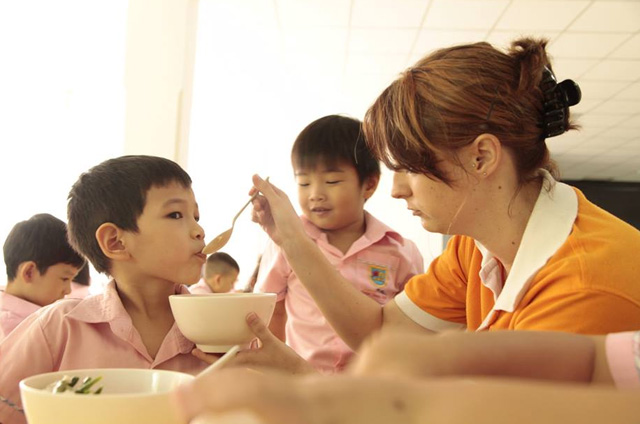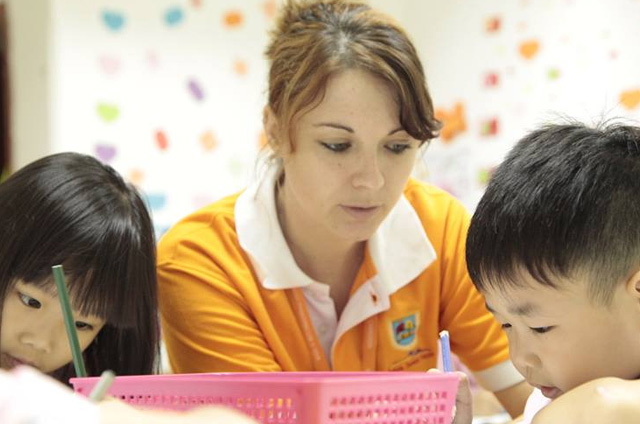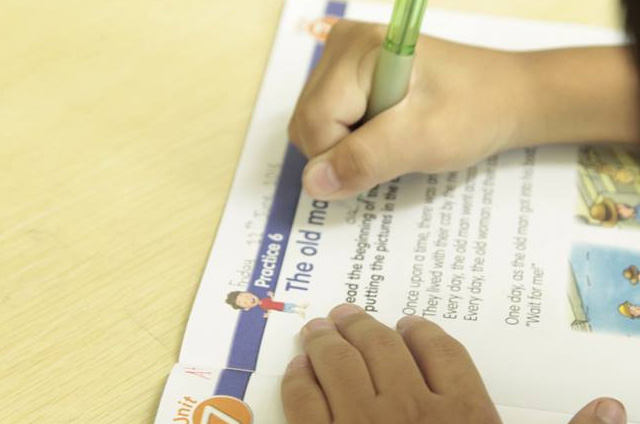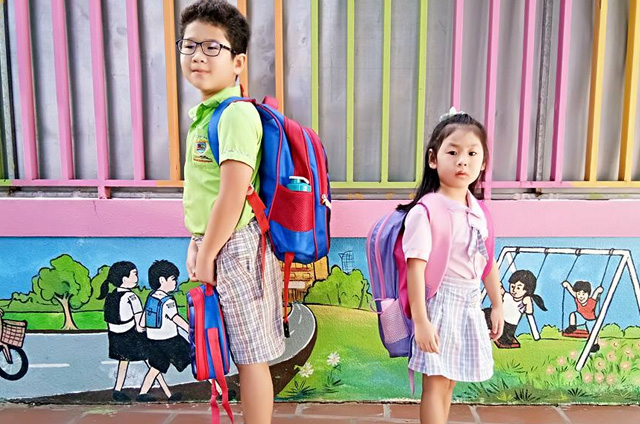The school year runs August to July at World International School Cambodia (WISC)
WISC is open for students from 24 months to 18 years old (Pre-Nursery – Grade 12).
WISC offers the International General Certificate for Secondary Schools (IGCSE) and Singapore curriculums from 24 months to 18 years old. Our early year’s students are nurtured on an individualized learning journey through a purposeful holistic approach which is aligned to the Singapore Ministry of Education (MOE) Kindergarten Framework. Teachers play a critical part of creating an environment where each child’s development is monitored and update parents as they see them progress.
WISC students can enjoy the opportunity to graduate with IGCSE credits from Grade 10 (age 15), which provides them with the option to graduate in Grade 12 with the High School Diploma with a choice of 2 different pathways – the full GCSE A, or Singapore GCE A Level. With over 70 IGCSE courses resulting in multiple options at the A level stage of the Studies, students are counselled and supported towards applications to leading university placement worldwide. For more information on university offers for our students, find out more here.
LOCATIONS:
Tuek Laak Campus
House No. 7, Street 230
Sangkat: Tuek Laak III
Khan: Toul Kork, Phnom Penh
Cambodia
Toul Kork Campus
House No. 11-13, Corner of Street 528 & 281,
Sangkat: Boeng Kak 1
Khan: Toul Kork, Phnom Penh
Cambodia
For directions on how to get to the respective campuses, click here.
Daily Mandarin and English is offered from 24 months Trilingual Khmer/Mandarin/English Program from age 6 Specialist English Learning from age 5 to 16 years old
For more information on our language programs, click here.
WISC has an extensive Co-Curricular Activities (CCAs) Program offered from as young as Pre-Kindergarten all the way to Grade 12 with over 20 choices to choose from. We believe in helping students to develop passions at a young age. For more information on the CCA Program, find out more here.
GCSE
Until 2013, the GCSE exam consisted of coursework - sometimes referred to as ‘controlled assessment’ - and exams. A review by Ofqual in 2013 concluded that the coursework element of GCSEs should be scrapped except, for example, in some subjects including science where experiments could demonstrate pupils’ knowledge. The emphasis now is for exams to be linear – that is with one final exam – rather than modular - the previous structure which allowed pupils to be assessed on smaller chunks of learning across two years.
GCSE exam grades are currently A*-G but these are due to change and will be replaced with Grades 1-9.
At present, some exams are two-tier, so pupils can be entered for the higher or foundation tiers with their final grade being determined by the tier. For example, at foundation level a Grade C may be the maximum.
The GCSE course is usually two years but some schools will allow more able pupils to complete it in one year, or take the exams a year earlier. The majority of the exams are in June, with re-sits taken in November.
So, to sum all of that up:
- Recent changes to the current GCSE exams mean that coursework is reduced to the absolute minimum.
- Most pupils are assessed by a final exam(s) at the end of two years rather than more frequent assessments over their course.
- Grades will change from A*-G and be replaced with Grades 1-9.
IGCSE
The International GCSE was first introduced around 25 years ago so that pupils overseas, whose first language was not necessarily English, could take the exam. The syllabus includes many elements that are now not in the revised GCSE - mainly coursework.
Assessment takes place at the end of the course and includes written, oral, coursework and practical assessment. Grades are the same as for GCSEs A*-G.
The subjects which can be studied are the same as for GCSE but also include many foreign languages.
Many independent schools now enter pupils for this exam – possibly because they have many pupils from overseas whose first language is not English- and also because a large number of schools were disappointed at how the GCSE English exam was marked in recent years with controversy over grade boundaries.
International Baccalaureate
The International Baccalaureate (IB or IBac) was developed in 1968 in Switzerland the IB has become very popular worldwide with independent schools. It is highly regarded by universities. International Baccalaureate is available at several levels but the one which applies to students age 16-19 is the IB Diploma.
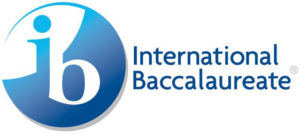
The IB Diploma
The Diploma Programme prepares students for effective participation in a rapidly evolving and increasingly global society as they:
- develop physically, intellectually, emotionally and ethically
- acquire breadth and depth of knowledge and understanding, studying courses from 6 subject groups
- develop the skills and a positive attitude toward learning that will prepare them for higher education
- study at least two languages and increase understanding of cultures, including their own
- make connections across traditional academic disciplines and explore the nature of knowledge through the programme’s unique theory of knowledge course
- undertake in-depth research into an area of interest through the lens of one or more academic disciplines in the extended essay
- enhance their personal and interpersonal development through creativity, action and service

What does the IB Diploma include?
Unlike A-levels which focus on three or four main subjects, the IB Diploma includes 6 groups of subjects.
IB Diploma Programme students must choose one subject from each of five groups (1 to 5), ensuring breadth of knowledge and understanding in their best language, additional language(s), the social sciences, the experimental sciences and mathematics. Student may choose either an arts subject from group 6, or a second subject from groups 1 to 5.
At least three and not more than four subjects are taken at higher level (240 teaching hours), while the other subjects are taken at standard level (150 teaching hours). Students can study and take examinations, in English, French or Spanish.
In addition to disciplinary and interdisciplinary study, the Diploma Programme features three core elements that broaden students’ educational experience and challenge them to apply their knowledge and skills.
How is the Diploma graded?
- The overall grade is a total of all the key areas studied – not each separate subject.
- Students are awarded a grade from 1-7 for each of the 6 key subject areas.
- In addition, 3 marks are available for certain parts of the course, making a possible total of 45 marks.
- The pass mark is 24 as long as a minimum number of marks is achieved across each part, along with a satisfactory level of achievement on creativity, action and service (CAS).
- The Diploma has a success rate of 80 per cent with less than 1 per cent of students achieving 45 marks.
The main difference is that the IGCSE still includes some elements of the old GCSE: coursework, oral and practical assessment as well as exams. The IGCSE is offered at different levels, and some teachers think that it has more scope for more able pupils at the higher level.
Some teachers – and pupils- think that the IGSCE exam is now easier than the new GCSE exam, because of the content of the syllabus and the range of assessment.
But be aware that some universities have their own preferences. An increasing number are happy to accept International GCSE English, but some will not.
If your child is heading for university you should, even at this stage, research entry requirements on each university’s website.
The IGCSE is graded from A* to G, with U stated as “Ungraded”. Students are required to obtain minimum grade C for the 5 core subjects in order to proceed to the next advanced level or further education. IGCSE grading overview is as below:

IGCSE offers more than 70 subjects. Students are required to take a minimum of 5 or maximum of 14 subjects.
The core subjects are English, Mathematics and Sciences.
Students can also choose other subjects ranging from Social Sciences (commonly Accounting, Business Studies, Economics, Sociology) to Arts & Technology (commonly Computer Studies, Information & Communication Technology (ICT), Art & Design).
A Student is awarded with one IGCSE certificate on each subject. If you take 5 subjects, your child will be awarded 5 IGCSE certificates. The number of subjects your child needs to be taken is varied from student to student and also depends upon individual aptitude and preference.
A-Level is a pre-university programme that’s based on the UK education system. Otherwise known as GCE Advanced Level, your child can take this course after completing his/her iGCSE and before pursuing a degree at university.
A-Level is administered by UK based examination boards such as Cambridge Assessment and International Examinations (CAIE) and Edexcel.
The programme is 15 to 24 months long, depending on when your child starts his/her studies.
It is 100% exam-based, where students take a minimum of 3 subjects.
A-Level consists of two parts:
- Advanced Subsidiary(or better known as AS Level), and
- A2 Level
AS Level is the first half of the programme and forms the foundation of A-Level.
A2 Level is the second part of the syllabus, covering more complex topics in the subjects that you have chosen.
Your child will typically take exams at the end of each level, with each level contributing 50% towards your final grade. That is to say, the final grade will comprise of - 50% from AS exams and 50% from A2 exams.
Your child’s final results will be a grade of A* to E for each subject taken. The maximum score is A*A*A* for 3 subjects, and A*A*A*A* for 4 subjects.





























